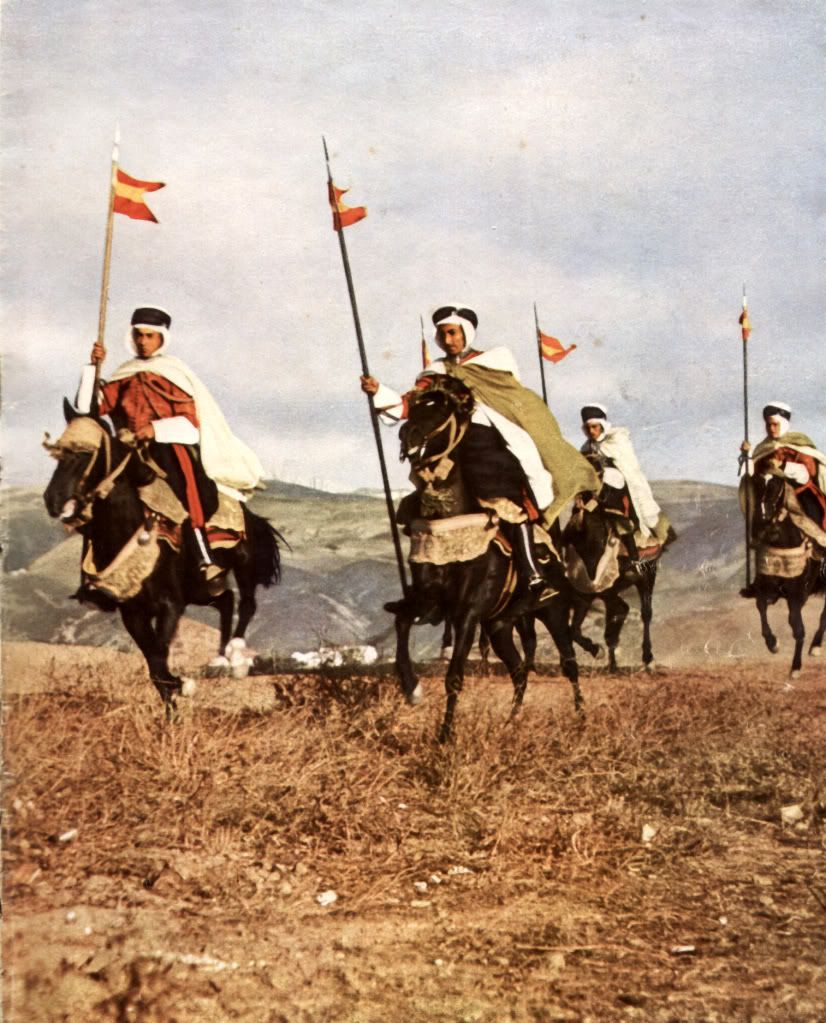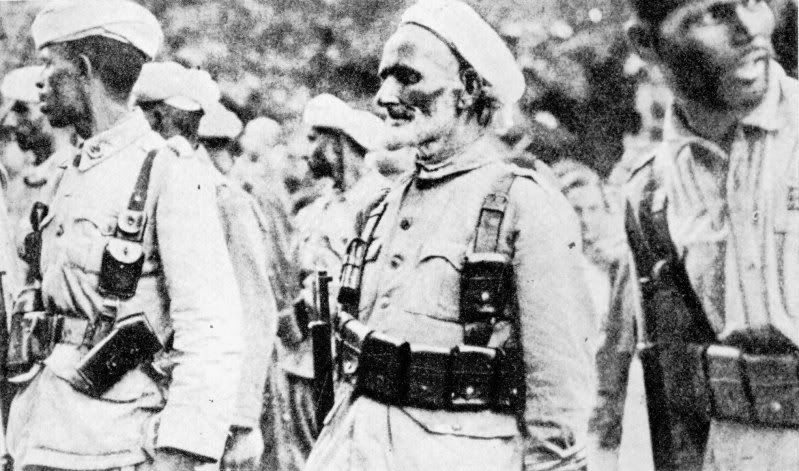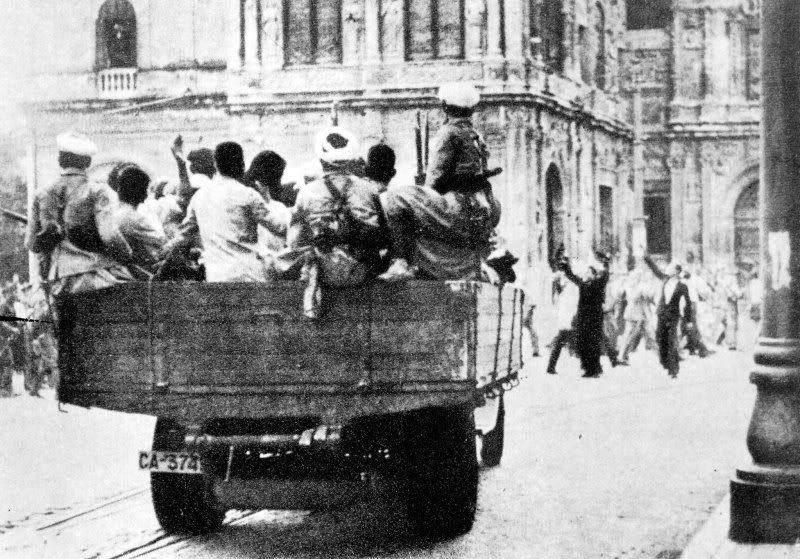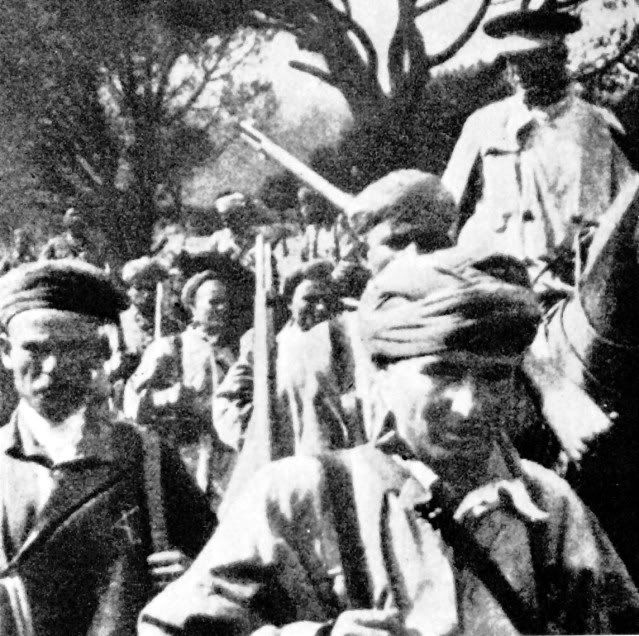Picture from the Spanish Civil War:[ol]
[li]La guerra ilustrada
[/li][li]Spanish Civil War Propaganda
[/li][/ol]
On a side note, isn’t anything but ‘anarchist’ to join together into military units?
A lot of those that referred to themselves as “anarchists” were as much totalitarian socialists as the Communists.
A. Doesn’t matter who they are. They’re all politicians. They all want power. Usually the most vicious fights are within rather than without the organisation. What remains often has more, rather than less, in common with the enemy. The circle of extremism that meets at the top.
B. About fifteen years ago, in my day job, an anarchist came to me.
He wanted advice about incorporating a club for anarchists.
As I so often do, I made an ill advised comment, along the lines of
“It intrigues me why the first thing that happens when a couple of anarchists get together is that they want to form an organisation.”
He seemed offended.
I never saw him again.
Exactly!
B. About fifteen years ago, in my day job, an anarchist came to me.
He wanted advice about incorporating a club for anarchists.
As I so often do, I made an ill advised comment, along the lines of
“It intrigues me why the first thing that happens when a couple of anarchists get together is that they want to form an organisation.”
He seemed offended.
I never saw him again.
LOL That reminds of that band, Chumbawamba I think, that had that big hit in the late 1990s “Tub Thumping.” They referred to themselves as an “anarchist collective.” This made them ripe for continual ownings by journalists asking them how you can be a anarchist in a collective. 
It’s a great drinking song though…
All songs are great drinking songs, if you drink while listening to them.
With one exception, I have never heard a song that can’t be drunk to.
Or that can’t be listened to while drunk.
Some songs encourage being drunk when they’re played, such as anything by the Bay City Rollers, Mrs Miller, Tiny Tim, and all gangsta rap bad ass bling mofo pop a cap in da face of ma biaatch shit.
As for Chumbawamba, it’s been very popular with various motivational and advertising thingies.
And here’s the song that is unbearable sober and, uniquely, even less bearable when drunk, which when not speaking in tongues has the temerity to refer to being drunk in the lyrics http://www.youtube.com/watch?v=ZeuNxMY_5Uo
Picture from the Spanish Civil War: [ol]
[li]La guerra ilustrada[/li]> [li]Spanish Civil War Propaganda[/ol][/li]
Very nice galleries, thanks. Definately the Republica won the propaganda war.
This is a good one “Marx, tu semillo fructifico”, Marx your seed has grown…speak for itself. :rolleyes:

Incidentally the PSOE is the todays ruling party in “multinational” Spain.
Hi I have read this article about the spanish civil war but I still don’t understand could somebody please explain to me?"
Tell me wich part you dont understand and I ll be pleased to explain you.
Well, at least they can have elections now…
Yeap, but is spected that the PP (partido Popular) shall win a crashing victory.
And with regard at the 1936 elections the final results were never published, is probably truth tos ay the left Union Popular won, but the percentage of that was never know.
Physicist work from data, poets and writers from intuition, and historians mainly from memories, honorable ladies and gentlemen - as if trying to save reality from some ether. But for some unknown reasons historical fact that tens of thousands of Moroccans who fought alongside General Francisco Franco from 1936 to 1939, during the Spanish Civil War, actually represented some kind of a non-existing phenomenon even among educated historians.
Although its outcome was determined to a large extent by the intervention of Hitler and Mussolini, who sent arms, supplies and soldiers to aid Franco, this disciplined and always serious man, a pious and conservative upper middle class Catholic, originally destined for a career as a naval officer, successfully used Moors as crusaders of traditionalist Christian Civilization in a striking instance of the pure historical irony.
Franco’s conservatives, who proudly proclaimed that they were carrying on the chivalrous tradition of the Spanish knights who had driven the Moors from the sacred soil of their Christian country, crying “Death to the Moorish infidel!” – brought back Moorish troops by the thousands through means of unparalleled personally conveyed and financially supported persuasion of the overwhelming majority of Moorish tribes and their lords to choose the Nationalist ride. It really is an astonishing fact that over 70.000 North Africans – often organized in tabors, of approximately 250 men – fought for Franco and became the “vertebral column of the Nationalist Army”, which distinguished in the battles of Madrid, Teruel and the Ebro.
This achievement was mainly a personal tribute of a single man – Franco - who volunteered for active duty in the colonial campaigns in Spanish Morocco that had begun in 1909, being transferred there in 1912 at the age of 19. The following year he was promoted to first lieutenant in an elite regiment of native Moroccan cavalry. At a time in which many Spanish officers were characterized by sloppiness and lack of professionalism, young Franco quickly showed his ability to command troops effectively and soon won a reputation for complete professional dedication. He devoted great care to the preparation of his unit and paid more attention than was common to the troops well-being. Reputed to be scrupulously honest, introverted, and a man of comparatively few intimate friends, he won respect of the local population also with his notorious ability to shun all frivolous amusements.
When at dawn on July 18, 1936 his manifesto acclaiming the military rebellion was broadcast from the Canary Islands, his old prominence was ready to lend a hand again. The following day he flew to Morocco and within 24 hours was firmly in control of the protectorate, its population and the Spanish Army garrisoning it. Since then, lance-bearing, scarlet-robed Moorish cavalrymen of the famous “Guardia Mora” have escorted him personally in every occasion, serving as his personal body guard unit until his death.

Escolta de S.E. el Generalísimo - Escuadrón de Caballería Mora : Défilé au Galop (Original inscription: Die Leibgarde des Caudillo, “Signal” U/Nr. 8-41)
Their traditional, old-fashioned utmost loyalty was absolutely legendary, even providing an additional designation - “The Spanish Gurkhas” for those exceptional and forgotten soldiers, incomparable in their fidelity and reliability to those they served.
Hmmm… I dont think they are so forgotten Lib. as you said they performed guard duties to Franco and were shown in public parades up to his death in 1975.
I read some time ago that the not only were moroccans but also a large quantity of Algerians enlisted in the Rebel army, mostly because unenmployent and also because the nationalist spreaded the rumour that the new Republicans were " enemies of Islam".
Maybe, my dear Mr. Panzerknacker. But we have to admit that there was and there still is very little original scientific research connected with this truly curious historical phenomenon. I know that there are still some unresolved issues, resulting mainly from conflicting reports, the lack of reliable sources, and a long period required for declassifying documents related to this specific topic. Nevertheless, it seems to me that we still are missing a coherent narrative about those dreadful, mysterious, indelible and rebellious fighters, which vividly and devotedly served their colonial masters in rough accordance with the old elegiac trepidation:
Without father without mother
Without God or homeland either
Without crib of coffin-cover
Without kisses or a lover…

Moorish troops - Tétouan, 1936
Our main trouble is that vague, sweeping generalizations tend to be accepted by an ill-informed public, and build themselves up into unproductive but powerful myths. Events of this magnitude continue to command attention and demand explanation, and perhaps straightforward questions and straightforward, factual answers are the best way toward the substantial analyses of ideological, economic and strategic questions needed for proper establishment of historical context in which those events took place.

Moroccan troops in Sevilla approaching Catedral de Santa María de la Sede - 1936
For example: What were the names of commanding officers of the Moroccan troops? What was the average length of active service within Colonial troops? How many people actually served as professional soldiers within the Nationalist Army? How many military clergyman were active within the Guardia Mora? What were the principal forms of religious instruction? How much money was spent on those activities? How disabled and wounded Morrocan soldiers were helped to return to their homeland? How Spain cared for crippled soldiers? How many physicians, dentists and nurses cared about wounded Moroccans? What kind of medical care was provided for needy Moroccan soldiers? What military ranks Moroccans were allowed to hold?

First contingent of Moroccan Regulares, transported by ship from Seuta, is arriving at Kadis – July 20th, 1936
Thos facts, my dear Mr. Panzerknacker are worth remembering, because - as you know - all historical parallels are imperfect and therefore dangerous. And that’s why our factographic undertaking is so challenging and utterly important. 
I think the higher rank was sargeant, captain and above were all spaniards.
By the way, sorry for my awful spelling in the lat post…i meaned this:
I read some time ago that the not only were moroccans but also a large quantity of Algerians enlisted in the Rebel army, mostly because unenmployent and also because the nationalist spreaded the rumour that the new Republicans were " enemies of Islam".
I am going to risk a generalization. The business of the loyalty of Moorish troops to the Nationalist/rebel cause is, indeed, in many ways mysterious, and certainly worthy of further research. One general suggestion is that, apart from economic considerations, the unusual atmosphere in Morocco and Algeria during the vicious Rif War of the early 20th century may have been a contributing factor. The savage campaigns of that war - which blooded so many Spanish (and French) officers of the time seems to have promoted strong devotion to “strong” leaders. The reprobates of the Spanish Foreign Legion would have followed their Dirlewanger-style leader, Milán Astray, the Hell and back; the Moors seem to have taken a similar shine to his protégé, Franco. Just a thought. Someone may be able to expand on it. Best regards, JR.
